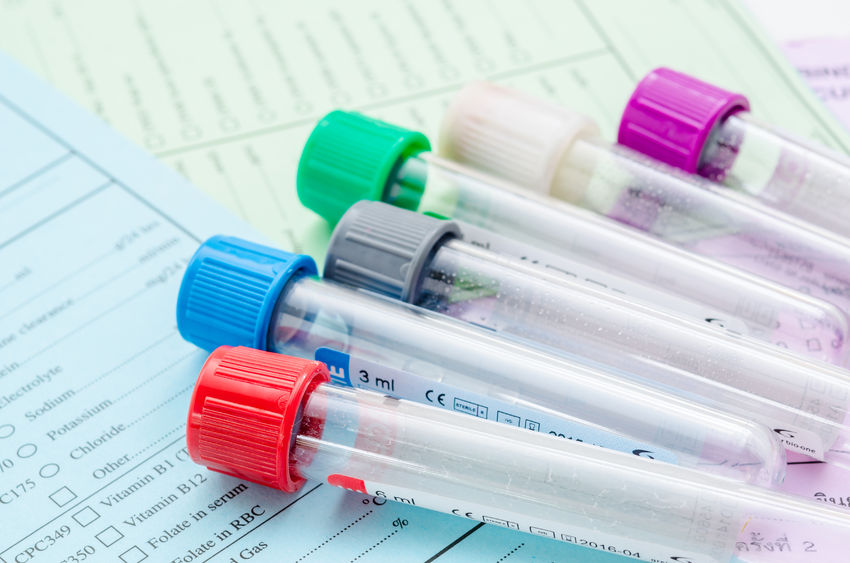
Triglycerides Body Fluid
What is this test?
This test is used to find out the triglycerides levels in the body fluid. Cholesterol is a waxy substance generally produced from the liver and in less amount from other parts of the body. Most of the cholesterol is available from the food items, that are consumed by an individual. Cholesterol is an essential lipid constituent of cell membranes. It is also required to form vitamin-d and a precursor of steroid hormones like androgens, estrogens, progestins, mineral corticosteroid etc. and of bile acids which are essential for fat digestion.
What is Cholesterol:
Cholesterol is synthesized from acetyl-CoA. So, acetyl-CoA is converted to hydroxymethyl glutaryl-CoA HMG-CoA and then with the help of HMG-CoA reductase, mevalonate is formed. Mevalonate is the converted to several isoprene intermediates and forms squalene. Squalene is then converted to lanosterol and then to cholesterol. Cholesterol is absorbed into the intestinal lining cells and then incorporated into the lipoprotein complexes. As cholesterol is insoluble in the blood it binds to the lipoproteins for transportation through the bloodstream and lymphatic fluid. After entering the blood lipoproteins carry cholesterol to the different organs and tissues of the body. The cholesterol then utilized by organs or tissues for several functions. The unused or excess cholesterol is stored as fat droplets in the adipose cells for further usage.
What are lipoproteins and their types?
Lipoproteins are lipid-protein complexes that help in the transportation of all lipids synthesized in specific organ and derived from food through the body by the bloodstream and lymphatic fluid. Lipoproteins are spherical in structure and are of four (4) types. Each type of lipoprotein has its own characteristic protein and lipid composition. They are the high-density lipoprotein (HDL), low-density lipoprotein (LDL), very low-density lipoprotein (VLDL), and chylomicrons. The difference in the types of lipoproteins is that the composition of lipid and protein.
Chylomicrons are the largest lipoproteins and have the lowest lipid to protein ratio. This carries the triglyceride, cholesteryl ester and free cholesterol into the heart muscle, skeletal muscle, lactating mammary tissue, and adipose tissue. VLDL is synthesized by the liver and is analogous to the chylomicrons. VLDL also deliver the triglyceride, cholesteryl ester and cholesterol to the heart muscle, skeletal muscle, lactating mammary tissue, and adipose tissue. As VLDL deposits its triglycerides, it becomes intermediate-density lipoprotein (IDL). LDL is derived from VLDL and IDL in the plasma. LDL contains large amounts of cholesteryl esters and cholesterol. Most of the cholesterol found in the plasma is associated with the LDL. HDL is the smallest lipoproteins and plays important role in the removal of excess or unused cholesterol from the cells and returns to the liver. The liver breaks down the returned cholesterol to bile acids and salts. LDL and HDL are the major factors in maintaining cholesterol levels in the body.
Why this test is performed?
This test is done to determine the presence of the chylous effusion. Chyle is the milky fluid containing lymph and some kind of fats. It is formed in the small intestine during digestion of fatty foods and carried by lacteals (lymph vessels). Chylous effusion occurs if there is a leak in the lacteals and it causes accumulation of chyle in the abdomen or thoracic region of the body. So, the doctor may recommend this test if an individual is suffering from ascites (accumulation of fluid in the abdomen), severe tachypnoea (abnormal rapid breathing). If an individual is on treatment for chylous effusion, then the doctor prefers this test to know the effectiveness of the treatment. This test also helps the doctor to determine if any bleeding has occurred in the body fluid. Mostly, this test is done along with other tests to finalize the diagnosis.
Precautions:
Drugs like rutin may change the levels of triglycerides in the body fluids. So inform your doctor prior to the test if you are on these medications.
Frequency:
For individuals who are diagnosed with chylous effusion, this test is recommended every 3 months of a year. The frequency of this test depends on various factors like age, history of a lymphatic disease, high blood pressure, physically inactive etc.
Test Preparation
Inform your doctor if you are on any medications, have any allergies or underlying medical conditions before your Triglycerides Body Fluid. Your doctor will give specific instructions depending on your condition on how to prepare for Triglycerides Body Fluid.
No specific preparation is necessary for this test.
Understanding your test results
If test results are more than the normal range then it may indicate that there is a chance of chylous effusion or non-chylous effusion. If test results are less than or equal to the normal range, then it may indicate that there may not be a chylous effusion.
| Gender | Age groups | Value |
| UNISEX | All age groups | > 110mg/dl is suggestive of chylous effusion |

